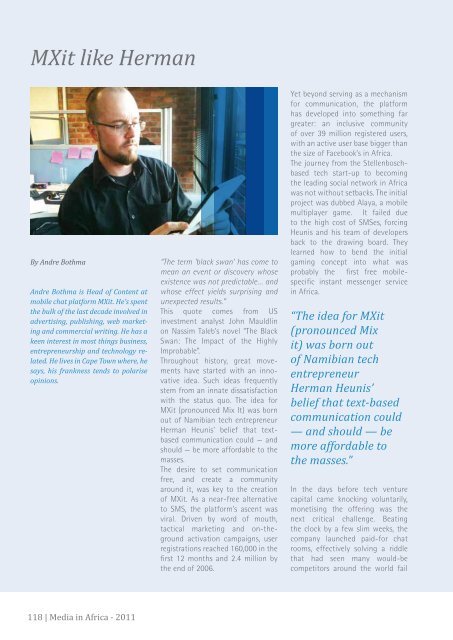Twenty years after the Windhoek Declaration on press freedom
Twenty years after the Windhoek Declaration on press freedom
Twenty years after the Windhoek Declaration on press freedom
You also want an ePaper? Increase the reach of your titles
YUMPU automatically turns print PDFs into web optimized ePapers that Google loves.
MXit like Herman<br />
By Andre Bothma<br />
Andre Bothma is Head of C<strong>on</strong>tent at<br />
mobile chat platform MXit. He’s spent<br />
<str<strong>on</strong>g>the</str<strong>on</strong>g> bulk of <str<strong>on</strong>g>the</str<strong>on</strong>g> last decade involved in<br />
advertising, publishing, web marketing<br />
and commercial writing. He has a<br />
keen interest in most things business,<br />
entrepreneurship and technology related.<br />
He lives in Cape Town where, he<br />
says, his frankness tends to polarise<br />
opini<strong>on</strong>s.<br />
118 | Media in Africa - 2011<br />
“The term ‘black swan’ has come to<br />
mean an event or discovery whose<br />
existence was not predictable… and<br />
whose effect yields surprising and<br />
unexpected results.”<br />
This quote comes from US<br />
investment analyst John Mauldlin<br />
<strong>on</strong> Nassim Taleb’s novel “The Black<br />
Swan: The Impact of <str<strong>on</strong>g>the</str<strong>on</strong>g> Highly<br />
Improbable”.<br />
Throughout history, great movements<br />
have started with an innovative<br />
idea. Such ideas frequently<br />
stem from an innate dissatisfacti<strong>on</strong><br />
with <str<strong>on</strong>g>the</str<strong>on</strong>g> status quo. The idea for<br />
MXit (pr<strong>on</strong>ounced Mix It) was born<br />
out of Namibian tech entrepreneur<br />
Herman Heunis’ belief that textbased<br />
communicati<strong>on</strong> could — and<br />
should — be more affordable to <str<strong>on</strong>g>the</str<strong>on</strong>g><br />
masses.<br />
The desire to set communicati<strong>on</strong><br />
free, and create a community<br />
around it, was key to <str<strong>on</strong>g>the</str<strong>on</strong>g> creati<strong>on</strong><br />
of MXit. As a near-free alternative<br />
to SMS, <str<strong>on</strong>g>the</str<strong>on</strong>g> platform’s ascent was<br />
viral. Driven by word of mouth,<br />
tactical marketing and <strong>on</strong>-<str<strong>on</strong>g>the</str<strong>on</strong>g>ground<br />
activati<strong>on</strong> campaigns, user<br />
registrati<strong>on</strong>s reached 160,000 in <str<strong>on</strong>g>the</str<strong>on</strong>g><br />
first 12 m<strong>on</strong>ths and 2.4 milli<strong>on</strong> by<br />
<str<strong>on</strong>g>the</str<strong>on</strong>g> end of 2006.<br />
Yet bey<strong>on</strong>d serving as a mechanism<br />
for communicati<strong>on</strong>, <str<strong>on</strong>g>the</str<strong>on</strong>g> platform<br />
has developed into something far<br />
greater: an inclusive community<br />
of over 39 milli<strong>on</strong> registered users,<br />
with an active user base bigger than<br />
<str<strong>on</strong>g>the</str<strong>on</strong>g> size of Facebook’s in Africa.<br />
The journey from <str<strong>on</strong>g>the</str<strong>on</strong>g> Stellenboschbased<br />
tech start-up to becoming<br />
<str<strong>on</strong>g>the</str<strong>on</strong>g> leading social network in Africa<br />
was not without setbacks. The initial<br />
project was dubbed Alaya, a mobile<br />
multiplayer game. It failed due<br />
to <str<strong>on</strong>g>the</str<strong>on</strong>g> high cost of SMSes, forcing<br />
Heunis and his team of developers<br />
back to <str<strong>on</strong>g>the</str<strong>on</strong>g> drawing board. They<br />
learned how to bend <str<strong>on</strong>g>the</str<strong>on</strong>g> initial<br />
gaming c<strong>on</strong>cept into what was<br />
probably <str<strong>on</strong>g>the</str<strong>on</strong>g> first free mobilespecific<br />
instant messenger service<br />
in Africa.<br />
“The idea for MXit<br />
(pr<strong>on</strong>ounced Mix<br />
it) was born out<br />
of Namibian tech<br />
entrepreneur<br />
Herman Heunis’<br />
belief that text-based<br />
communicati<strong>on</strong> could<br />
— and should — be<br />
more affordable to<br />
<str<strong>on</strong>g>the</str<strong>on</strong>g> masses.”<br />
In <str<strong>on</strong>g>the</str<strong>on</strong>g> days before tech venture<br />
capital came knocking voluntarily,<br />
m<strong>on</strong>etising <str<strong>on</strong>g>the</str<strong>on</strong>g> offering was <str<strong>on</strong>g>the</str<strong>on</strong>g><br />
next critical challenge. Beating<br />
<str<strong>on</strong>g>the</str<strong>on</strong>g> clock by a few slim weeks, <str<strong>on</strong>g>the</str<strong>on</strong>g><br />
company launched paid-for chat<br />
rooms, effectively solving a riddle<br />
that had seen many would-be<br />
competitors around <str<strong>on</strong>g>the</str<strong>on</strong>g> world fail












